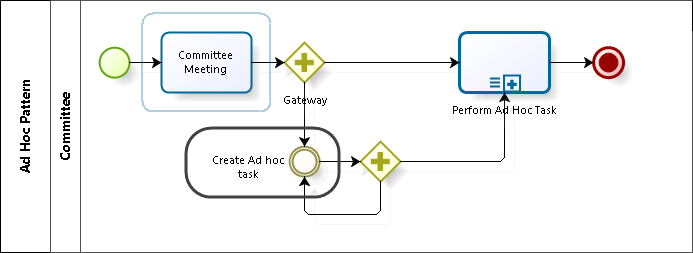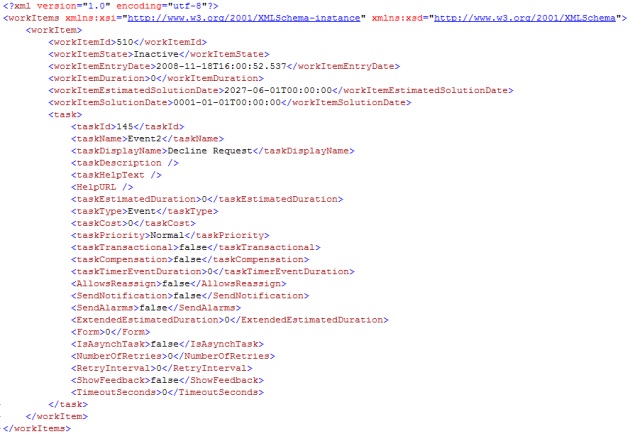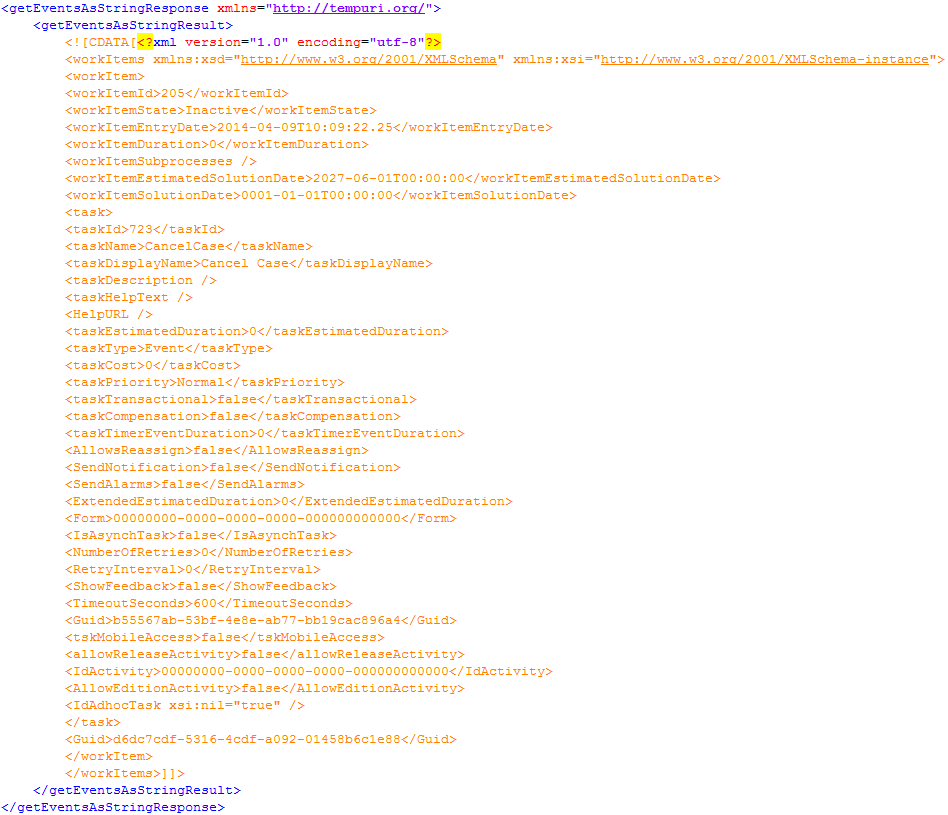Overview
This Web method is used to obtain available Events in Bizagi (from an external application).
Available Events in Bizagi Processes are those which are Intermediate Events with no specific type defined, which are already active and waiting for the possibility to be triggered.

This method receives a single input having mainly: The identifier for the specific case (Process instance) or any other filter criteria.
Through this method, the list of available Events for a case is obtained. This list corresponds to Events which can be also set at Bizagi Work Portal.
For further information about the Events shown at the Work Portal, please refer to Bizagi Work Portal.
•For the getEvents method, the request and response XML's are of the native .NET XmlDocument type.
•For the getEventsAsString method the same XML structure is handled, but this parameter is sent as a string type.
Input
Input Schema
The following shows a sample XML structure of information to send to Bizagi:
<?xml version="1.0" encoding="utf-8"?>
<xs:schema xmlns:xs="http://www.w3.org/2001/XMLSchema" elementFormDefault="qualified" attributeFormDefault="unqualified">
<xs:element name="BizAgiWSParam">
<xs:complexType>
<xs:sequence>
<xs:element name="domain" type="xs:string" minOccurs="0"/>
<xs:element name="userName" type="xs:string" minOccurs="0"/>
<xs:element name="radNumber" type="xs:string" minOccurs="0"/>
<xs:element name="processName" type="xs:string" minOccurs="0"/>
<xs:element name="idCase" type="xs:integer" minOccurs="0"/>
</xs:sequence>
</xs:complexType>
</xs:element>
</xs:schema>
Input Parameters
•BizAgiWSParam: Root node. All possible filters are included here and are optional.
If more than one search criteria is used, the result would be only activities complying with all the conditions.
•domain: Search Events whose assigned user belongs to this domain.
•userName: Search Events whose assigned user is the one indicated here.
•radNumber: Events belonging to this creation number (case number).
•processName: Gets Events of this Process (enter the Name, not the display name).
Input Example
In the following example, we obtain those Intermediate Events which are currently available for the case with identifier = 351.
We suggest you use How to start a process in Bizagi from other applications as a guideline to invoke this service.
GetEvents Method Input
<BizAgiWSParam>
<radNumber>351</radNumber>
</BizAgiWSParam>
GetEventsAsString Method Input
<actFilters>
<![CDATA[<BizAgiWSParam>
<radNumber>351</radNumber>
</BizAgiWSParam>]]>
</actFilters>
Output
Output Schema
The following shows a sample XML structure of information returned by Bizagi:
<?xml version="1.0" encoding="utf-8"?>
<xs:schema xmlns:xs="http://www.w3.org/2001/XMLSchema" elementFormDefault="qualified">
<xs:element name="workItems">
<xs:complexType>
<xs:sequence>
<xs:element name="workItem" type="workItemType" minOccurs="0" maxOccurs="unbounded"/>
</xs:sequence>
</xs:complexType>
</xs:element>
<xs:complexType name="workItemType">
<xs:sequence>
<xs:element name="workItemId" type="xs:integer"/>
<xs:element name="workItemState" type="xs:string"/>
<xs:element name="workItemEntryDate" type="xs:dateTime"/>
<xs:element name="workItemDuration" type="xs:integer"/>
<xs:element name="workItemEstimatedSolutionDate" type="xs:dateTime"/>
<xs:element name="workItemSolutionDate" type="xs:dateTime"/>
<xs:element name="task">
<xs:complexType>
<xs:sequence>
<xs:element name="taskId" type="xs:integer"/>
<xs:element name="taskName" type="xs:string"/>
<xs:element name="taskDisplayName" type="xs:string"/>
<xs:element name="taskDescription" type="xs:string"/>
<xs:element name="taskHelpText" type="xs:string"/>
<xs:element name="HelpURL" type="xs:string"/>
<xs:element name="taskEstimatedDuration" type="xs:integer"/>
<xs:element name="taskType" type="xs:string"/>
<xs:element name="taskCost" type="xs:integer"/>
<xs:element name="taskPriority" type="xs:string"/>
<xs:element name="taskTransactional" type="xs:boolean"/>
<xs:element name="taskCompensation" type="xs:boolean"/>
<xs:element name="taskTimerEventDuration" type="xs:integer"/>
<xs:element name="AllowsReassign" type="xs:boolean"/>
<xs:element name="SendNotification" type="xs:boolean"/>
<xs:element name="SendAlarms" type="xs:boolean"/>
<xs:element name="ExtendedEstimatedDuration" type="xs:integer"/>
<xs:element name="Form" type="xs:integer"/>
<xs:element name="IsAsynchTask" type="xs:boolean"/>
<xs:element name="NumberOfRetries" type="xs:integer"/>
<xs:element name="RetryInterval" type="xs:integer"/>
<xs:element name="ShowFeedback" type="xs:boolean"/>
<xs:element name="TimeoutSeconds" type="xs:integer"/>
</xs:sequence>
</xs:complexType>
</xs:element>
</xs:sequence>
</xs:complexType>
</xs:schema>
Output Parameters
•workItems: This is the root node of the response; it contains a "workItem" node for each Event included in the result.
•workItem: This is a specific Event (an instance of a Task) of the Process that is active for a case.
•workItemId: Identification number or key of the Task.
•workItemState: State in which the Task is.
•workItemEntryDate: Date and time when this Task was reached.
•workItemDuration: Is the estimated duration, in minutes, for this Task.
•workItemEstimatedSolutionDate: Is the Task’s estimated solution date.
•workItemSolutionDate: The actual date on which the Task was completed.
•task: Contains information about Tasks corresponding to the Event.
•taskId: Identification number or key of the Task.
•taskName: Name of the Task.
•taskDisplayName: Display name of the Task.
•taskDescription: Task’s descriptive text.
•taskHelpText: Task’s help text.
•HelpUrl: URL with information of the Activity.
•taskEstimatedDuration: Is the estimated duration, in minutes, for the Task.
•taskType: Type of Task.
•taskCost: The estimated cost of the Task. This value, like the estimated dates, is configured and determined by the designer of the Process.
•taskPriority: Fulfillment priority of the Task.
•taskTransactional: An indicator stating if a Task is transactional.
•taskCompensation: States if this is a compensation Task.
•taskTimerEventDuration: If this Task has an attached Timer Event, it will contain its duration in minutes.
•AllowsReassign: A marker showing if this Task may be reassigned to another user.
•SendNotification: Indicates if an email must be sent to a user informing of the availability of the Task.
•SendAlarms: Indicates if an email must be sent to the assigned user informing that the Task is at risk of being overdue.
•ExtendedEstimatedDuration: Estimated extended time duration.
•Form: Reserved for future use.
•IsAsynchTask: Specifies if this is an asynchronous Task or not. Usually used for interfaces.
•NumberOfRetries: Applies to asynchronous Tasks. Is the number of automatic retries for the Task in case it fails (an exception is thrown).
•RetryInterval: Applies to asynchronous Tasks. Is the time (in minutes) between each retry.
•ShowFeedback: Applies to asynchronous Tasks. Indicates if the user is to be informed when an error occurs.
•TimeoutSeconds: Applies to asynchronous Tasks. Time (in seconds) the asynchronous Task will wait for the external system to respond.
Output Example
In the following example, we illustrate a returned XML-structured sample response from Bizagi SOA layer:
GetEvents Method Output

GetEventsAsString Method Output

Related Web methods
If you wish to obtain a list of pending Activities in the Process (those at the Inbox), use the getActivitiesAsString or getActivities Web method.
For further information refer to the Get Activities article.
Once you obtain the list of available Events, you may want to trigger an available Event.
For this, use the setEventAsString or setEvent Web method.
For further information refer to the Set Event article.
Last Updated 1/6/2022 5:13:54 PM